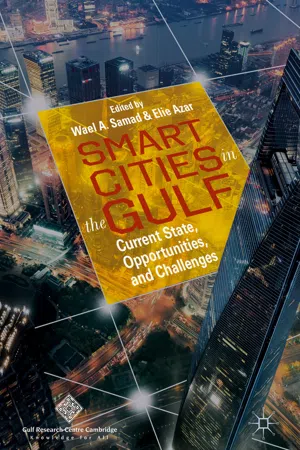Background
The notion of a Smart City is one of the rapidly emerging topics in modern sustainability trends, and understandably so. Although the term Smart City has appeared in literature as of the late 1990s, there still is some confusion with regard to its exact meaning, context, and methods of assessment and quantification. However, and irrespective of a Smart City’s precise definition, Smart City initiatives are actively being implemented in various developed cities worldwide, while their application in Gulf Cooperation Council (GCC) cities is fairly limited, and when so, often inorganic. Various challenges are ahead of GCC cities for an effective transformation toward a Smart City model. The dimensions of these challenges include political, socio-economic, technological, local talent resources, policy, cyber, and infrastructural aspects, with their proper integration being an essential element.
With that, the purpose of this edited volume is to expand on the current state, opportunities, and challenges related to Smart Cities in the GCC. The scope is well along the lines of the United Nation’s (UN’s) Sustainable Development Goals (SDGs); in particular, the 11th pillar on “Sustainable Cities and Communities”. This edited volume comes as a result of the compilation of some of the insightful papers, presentations, and discussions by participants at the 8th Gulf Research Meeting, which was organized by the Gulf Research Centre and held at the University of Cambridge in August 2017. Participating authors included a diverse mix of experts from various disciplines and sectors such as policy makers, engineers, political and social scientists, architects, educators and researchers.
Cities throughout the world are facing significant urban sustainability challenges related to their various sectors such as buildings, transportation, industrial, healthcare, and education (Newman and Jennings 2012). With the worldwide current and anticipated population growth, the sustainable management of key resources including energy, water, and food has become inevitable (Albino et al. 2015). This has contributed to the recent concept of a Smart City: a city that creates sustainable development and high quality of life through the smart and adaptive management of its resources (Hollands 2008; Neirotti et al. 2014). Cities in GCC countries are at the front line of such increasing demands with their projected population growth being among the highest worldwide; well over 30 times that of European Union countries (IRENA 2016; IEA 2015). A transition toward smarter GCC cities is vital to an improved management of resources, a high living standard, and a knowledge-based economy. As a matter of fact, knowledge has become a key element of growth in what is often referred to as a “knowledge-based city”, where innovation and information exchange are fostered into that environment to drive and lead a positive change (Ingallina 2018; Leducq et al. 2017; Carrillo et al. 2014). Such a vision is in agreement with the SDGs declared in the UN resolution A/RES/70/1 of September 2015. Specifically, the 11th goal titled “Sustainable Cities & Communities” is a confirmation of the need for immediate action toward more sustainable and Smart City initiatives (UNDP 2015).
In recent years, some efforts have been taken by Gulf public and private entities to make particular sectors more efficient; that is, smarter (Tok et al. 2015). However, such efforts have typically been segregated among the various constituents of a city, and thus failing to truly achieve the full potential of a smart and integrated city. For instance, critical resources such as energy, water, and food are intricately linked and actions in one area have a direct impact on the others (FAO 2014). As a result, applying a “smart” supply-side energy management platform in GCC cities will only be beneficial granted it accounts for—and adapts to—its implications on the other resources.
A common misconception is that the essence of a Smart City revolves around the adoption of new technologies , when the main goal is the application of such technologies in the form of means to improve the well-being of the inhabitants of the city (Nam and Pardo 2011). Moreover , and with the surplus of data being collected from numerous sensory connected devices, the challenge of a Smart City is now more centered about drawing conclusions and insights from data for optimal decision-making (Bessis and Dobre 2014).
In the end, each city is unique, posing its own challenges and aspirations depending on almost every aspect of a nation from location, stability, economy, political leadership, level of advancement, readiness of the citizen, and so on. What works as a framework for one city will not necessarily apply for another . Even within the GCC, and contrary to common perception, cities and their inhabitants are quite unique, which further complicates the model of a Smart City that Gulf cities can aspire to achieve.
Objectives and Target Audience
Filling a void in academic and governance-relevant literature on the topic of Smart Cities in the Gulf region, this edited volume provides a multidisciplinary analysis of the current state, key opportunities, and challenges related to realizing this goal, including infrastructure, information and communication technology (ICT), frameworks, as well as social and well-being perspectives. Eleven insightful analyses on Gulf-specific aspects of Smart Cities are presented, examining the current state, opportunities, and challenges, while identifying key takeaways. The editors believe that this volume is the first of its kind to address Smart Cities in the Arabian Gulf region. The edited volume serves as an essential reading for researchers and practitioners studying smart cities in general and the current state, challenges, and opportunities for GCC cities more particularly. The book tackles diverse topics given the multidisciplinary topic of Smart Cities, and as such will cater to a wide spectrum of audience. Furthermore, the book can be of great benefit for instructors offering undergraduate or graduate courses in disciplines related to City...
